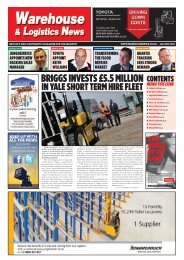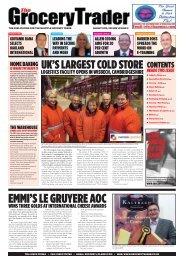01 Front:Layout 1 - Grandflame Ltd
01 Front:Layout 1 - Grandflame Ltd
01 Front:Layout 1 - Grandflame Ltd
- No tags were found...
You also want an ePaper? Increase the reach of your titles
YUMPU automatically turns print PDFs into web optimized ePapers that Google loves.
Page 8 April 2<strong>01</strong>1Email: grocery@flame1.com BIBBY CONSULTING & SUPPORTTel: <strong>01</strong>923 272960BIBBY CONSULTING & SUPPORTWHY CUTTING EMPLOYEE POWER CAN HELP THE FOOD RETAIL SECTOR TO GROWIf we are to believe what we are told,there are still austere times aheadand virtually no industry is going tocome out the other side unscathed,including the food retail sector.It's no exaggeration to say that businessesof all sizes and types are going tohave to keep their belts tight and operateat maximum efficiency. However, accordingto a major new survey by Bibby Consulting& Support - www.bibbycas.com - , expertsin Employment Law and Health & Safetylegislation, most businesses feel they areworking with one hand tied behind theirback because of all the 'red tape' they haveto deal with.In particular, the Bibby EmployerSurvey* found that senior managers hadreal concerns about recent "ridiculous"laws giving employees an increasingamount of power and they felt their businessescould perform better if employeepower was curtailed.Respondent after respondent echoedthis sentiment and said that so muchemployee-friendly legislation had underminedtheir ability to manage staff. A veryclear picture emerged of company ownersand managers who felt the contract foremployment was so one-sided that itseemed as if employees had the rightswhile employers had the obligations.To illustrate the point, one senior managerasked incredulously: “Who is theboss?” Others complained that they sawthe “balance of power moving awayfrom the employer to the employee”,that employees were "able to get awaywith anything”, and that there were“more and more rights for theemployees and none for the businessowner”. More managers talked aboutlaws being "geared up to favour theemployee, taking rights and protectionaway from the owner”. Some complainedabout “increasinglyburdensome rules & regulations inemployment law” with the “balanceswung too far in the employee'sfavour”. And one reckoned the'playing field' "sloped very much in favourof the worker”.Such strongly held opinions tingedwith anger and frustration cannot bodewell for employer-employee relations. Inthis way, extending the rights ofemployees by too much could be seen tohave the potential for damaging theirfuture prospects rather than improvingthem.Every company operating in the retailand food sector knows that it is absolutelyvital to comply with the latest legislationrelating to the treatment of employees. Butmany know only too well that this is easiersaid than done and the Bibby EmployerSurvey showed that businesses of all kindswere desperate for help to unburden themselvesof 'red tape'.The Institute of Directors (IoD) recentlycalculated that last year company directorsspent around 17 hours a month - or £7,674per director - filling in forms, reading complianceguidance and requesting legaladvice. This is equivalent to more than£110bn in 12 months and something whichthe IoD identified as a major barrier to businessgrowth.The Bibby survey supported these estimateswith feedback from companieswho said that they were devoting fartoo much valuable time and money tofire-fighting legislation. Senior managerssaid they would rather spendthese precious resources on trainingemployees, developing their skills andmotivating and supporting them toimprove the business.An extremely powerful messagecoming out of the Bibby EmployerSurvey was that excessive bureaucracywas bad for businesses and the mostrecent changes had been anything butemployer-friendlySpecifically, the survey revealed considerableconcern and frustration - in somecases real anger - about the difficultiesinherent in employing staff in the UK. Manymanagers felt that disciplining or getting ridof staff was extremely difficult.Respondents complained about disciplinaryaction being a “laborious process” and handlingunder-performing employees wasincreasingly difficult. One commented thatdisciplining staff required "too many proceduresto follow”.Moving away from assessing the generalemployee relationship to specific legislation,a large proportion of the respondentswere still struggling to grasp the basics ofthe 2<strong>01</strong>0 Equality Act, which they perceivedto be too complex. Indeed, many managersadmitted that they were genuinely fearful ofthis new legislation and were very concernedabout how much they might have tochange the way they operate in order tocomply with it.A particularly noteworthy theme ofresponses to the survey was that threequarters of companies felt they neededexternal assistance when dealing withemployee issues. In particular, they saidthey needed help with the employmentcontract, with disciplinary/misconductissues, dismissal/unfair dismissal and managingtribunal processes.On the issue of employment tribunals,the survey asked: “What is your feelingabout your organisation’s preparedness tohandle a claim?” Unsurprisingly just 8.5%of respondents said they could copewithout external assistance and a massive69% felt that they would have to bring helpin from outside.Employment tribunal claims are on theincrease but most companies who took partin the Bibby survey said they felt vulnerableto vexatious claims and that the employeewas, in effect, in the driving seat when itcame to making allegations that coulddamage a company. Respondents thoughtthat employees' rights had been strengthenedto the point that companies werevirtually powerless against staff makingunfounded claims.Irrespective of the size or nature of abusiness, or how well staff are managed,having to defend a case at an employmenttribunal can be an extremely intimidatingand stressful situation. With this in mind,Bibby Consulting & Support is holding practical,hands-on ‘mock tribunal’ training sessionsfor businesses. These courses preparedelegates for a tribunal, enabling them tolearn exactly how and in what way they canfulfil the vital role as a witness for the businessin a tribunal hearing.The course helps delegates to understandthe tribunal structure and the typesof claims it handles. Delegates learn,through a ‘case example’ what is needed toprepare for a hearing, what can be done toimprove the chances of success, and themost effective way to give evidence. Theywere also given strategies - and practice -on how to cope as a witness at a tribunal.In a similar vain, the Institute of Directorsrecently said that it wanted to see workersbeing charged at least £500 to taketheir employer to a tribunal, considerationfor the removal of employees’rights to ask for flexible working andthe abolishment of the right torequest paid time off for training.However, Bibby Consulting &Support wouldn't recommend goingthat far. For example, while it was agood idea to introduce a fee thatemployees would pay when taking acompany through the tribunalprocess, £500 was perhaps toomuch and therefore unlikely tobe accepted by the presentgovernment.Said Michael Slade, ManagingDirector of Bibby Consulting &Support: “We would suggest introducinga more reasonable fee - say inthe region of £100 - for employeeswanting to take an issue to tribunal.This would deter vexatious claims andserial litigants, and those with a genuinegrievance needn't worry with thefee being recoverable if the claim issuccessful. However, there should alsobe an element of flexibility for no fee tobe required in cases involving low paidworkers." With regard to flexibleworking, we wouldn’t support the ideaof completely scrapping it, optinginstead for simplifying an unnecessarilycomplex processHe added: “All reputable businessesunderstand that there will be times whencomplainants have a legitimate case andwill want to support employees throughstandard grievance procedures. But mostcompanies would welcome the ability tofilter out the weaker claims and certainlythose that have no substance at all.”On the other issues, Slade said: “Whilewe feel that flexible working is beneficialto employers and employees alike,there should be no reason why thiscannot be agreed on an informal basis.It is important that requests for flexibleworking are considered andaccommodated where possible but itis difficult to see what benefit isachieved by the current onerous proceduralrequirements. And there issimply no point to the current trainingrequest scheme.”As well as offering advice and supportfor a company if something goeswrong, Bibby specialises in providingthe kind of services that help businessesto support and protect theiremployees to keep problems to a minimum.As every company knows, a happy memberof staff is less likely to take legal actionagainst their employer than an employeewho feels they are being mistreated, disrespectedand not valued.Tailoring its human resources (HR) supportto individual companies, BibbyConsulting & Support partners retail businessesin managing their most importantassets – people. All businesses can benefitfrom lower staff turnover, easier recruitment,less absenteeism and moreproductivity. To this end, Bibby recognisesthat sophisticated selection andrecruitment methods, flexibility ofterms, a high level of employment securityand staff wellbeing all offerconsiderable business benefits.Bibby Consulting &Support is one of theUK’s leading providersof compliance managementservices. Thecompany enablesemployers and seniormanagers to becomeand remain compliantinemployment law,health and safety andenvironmental legislation.Based inNewcastle-under-Lyme,Bibby Consulting &Support is part of the Bibby Line Group, afamily run business with a 200-year historyof specialising in retailing, financial services,logistics, shipping, marine andoffshore services.Bibby Consulting & Support’s raisond'être is to safeguard businesses and businessowners through the expertmanagement of human resources andensure essential compliance with key legislationin the complex fields of safetyenvironmental and employment legislation.Being part of an international organisation,Bibby Consulting & Support has thecapacity to provide scalable solutions. Sohowever complex or sensitive an issue, orhowever large an organisation is, the companyis able to add real value to anybusiness.The employment law services Bibbyoffers cover a range of issues, includingcomprehensive HR systems and procedures,clear and concise terms &Michael Slade, MD of Bibby Consulting& Support.conditions and handbooks.Companies also have access 24hours a day seven days a week to asupport line managed by qualifiedemployment law specialists.Michael Slade said: “Businesses inthe food retail sector facemany challenges nowadays.Competition isever fiercer and deadlinesever tighter. Aspressure on the bottomline continues toincrease, it is vital thatmodern businessesmaintain a firm grip ontheir two most importantand valuable assets - peopleand reputation.“We make sure that clientsoperate within the legalframework and are kept upto-datewith changes in thinking andlegislation. Our aim is to ensure that notonly will the basics be right but also thatclients are fully protected from frivolousand potentially damaging claims. We provideorganisations with the guidance theyneed to take their business to the nextlevel in best practice while delivering a realcompetitive edge.”Slade concluded: "This survey shows alltoo clearly that companies are very worriedabout the effect that years of legislationhave had on shifting more and more powerinto the hands of employees. Obviouslynobody wants to go back to the days ofemployees only having half of the rightsthey do at the moment – that is not whatthis survey said – but there is a clear desireto make the playing field a little more levelfor employers."Having businesses in the food retailsector feeling that they are being heldback by current legislation - indeed someof them literally frightened by what theycould be liable for - does not create agood environment for them to be facingthese extremely challenging times.Something needs to be done to helpthese companies and it needs to be donesoon."* In February 2<strong>01</strong>1, Bibby Consulting& Support carried out a large-scalepiece of business research. The BibbyEmployer Survey investigated thoughts,feelings and concerns in relation tohuman resource issues facing managersand owners of organisationsacross the UK. In all, 2,410 employersand 1,000 employees were invited totake part and a remarkable total of 424clients participated in the full survey. Thisprovided a robust sample size, with allindustry sectors and size of organisationsrepresented.BIBBY CONSULTING & SUPPORT TEL: 08453 100 600 WWW.BIBBYCAS.COM














